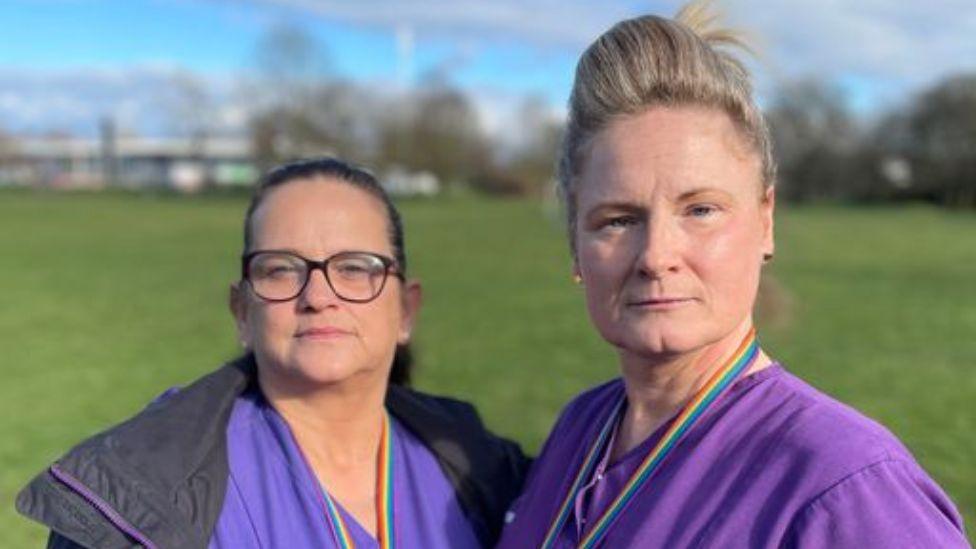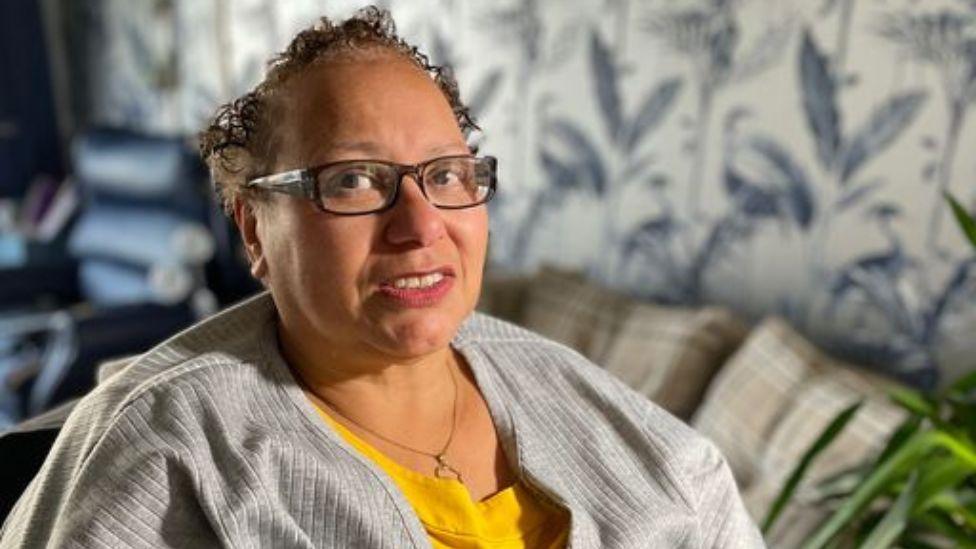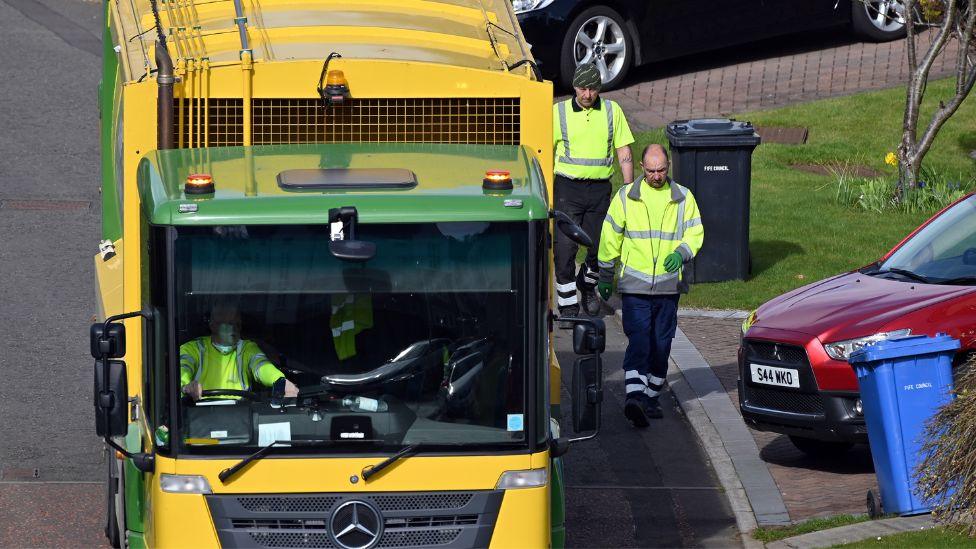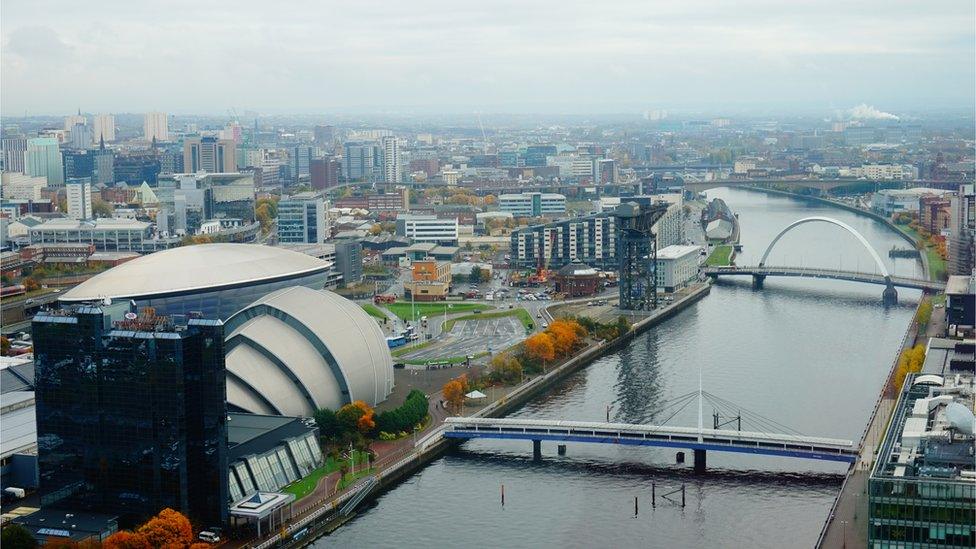Glasgow cuts £22m from health and social care services
- Published

Glasgow's Health and Social Care Partnership (HSCP) has revealed budget cuts of nearly £22m.
The Integration Joint Board - which administers social care, addiction and homelessness services - approved the cuts, including the loss of 197 full-time equivalent posts.
The partnership said it had worked to produce a "balanced budget" that "minimises the impact on services".
The GMB union warned it would have a "devastating" affect on service users.
Funding for self-directed support, which allows disabled people to organise their own package of care, is to be slashed by £2.3m.
A report by the Integration Joint Board said it could result in 13-month waits for care packages, while there will be no transitionary fund for children moving into adult services.
The number of home care hours will also be cut to bring in savings of £900,000.
A total of 197 full-time equivalent posts are expected to be lost.
Other savings include a reduction in day care services for older people, fewer care home beds and the defunding of a service for children of parents with addictions issues.

Lorraine Morris and Clairelee Kelly work in care services
The union Unison staged a protest outside HSCP headquarters.
And GMB Scotland organiser Sean Baillie told the BBC that Glasgow's community health teams were being "absolutely destroyed".
"It's going to have a huge, huge devastating impact not only to workers and service users but also the wider communities," he said.
Mr Baillie said unions had been told that Glasgow's HSCP expects to run out of funds by September.
He added: "There's going to be an emergency situation then where more cuts are found or the care services are paused."
'Care they deserve'
Lorraine Morris, a GMB union member and home carer for Glasgow HSCP, told BBC Scotland that increasing workloads due to sickness were already putting a strain on her ability to provide "adequate care".
"I do what I have to do, but I worry that that client needs more. We don't have the time. If we are worried about them, we will email in, but that again takes time.
"Sometimes my clients will joke, 'I've blinked and I've missed you.'"
Colleague Clairelee Kelly, who has worked as a carer for three years, said they only get about 20 minutes with each client when travelling time is considered.
She added: "As soon as you leave your house in the morning, the clock is ticking. And you are concerned you're going to meet their requirements.
"You don't want to fail your client. You want to provide the care that they deserve."

Paula Fummey relies on support from carers
Paula Fummey, who has rheumatoid arthritis and relies on four visits from Glasgow HSCP home carers a day, says her support has been cut to to 55 minutes for longer visits and 30 minutes for lunchtime ones.
"It adds stress," she told BBC Scotland. "I feel bad that the carers have to get things done more quickly.
"They need to get away by a certain time so they forget to do things and you are stuck."
The 59-year-old has been waiting since 2017 to get self-directed support, which allows for more flexible carer support.
"I think I should get self-directed support because I am put to bed at 8pm," she said. "You can't go to the football, you can't go to the cinema or the theatre.
"In the summer when the nights are light, all the school bairns are out playing and I'm stuck in the house."
Significant pressure
The Integration Joint Board - which is made up of eight voting members from the council and eight non-executive members appointed by the Scottish government - passed the amended motion on the HSCP budget.
Members also passed an amendment which warned of the potential risk of the HSCP being unable to fulfil its statutory duty to provide social care to Glasgow residents.
A spokesperson for the Glasgow HSCP said: "The pressure on public service budgets is significant - and high inflation means that this year has been a particular challenge.
"Officers have worked hard to bring forward a balanced budget that, wherever possible, minimises the impact on services and invests in priorities.
"Clearly, though, members of the Integration Joint Board have serious concerns and will be making that point to stakeholders."


In budget papers published at the weekend, there were clear warnings about the impact on "vulnerable citizens" or those in "critical need" across Scotland's biggest city.
The city's social care partnership was warned by the council's chief social worker that the cuts being proposed would leave authorities at "risk of not fulfilling our statutory responsibilities".
As demand is expected to rise for social care in Glasgow, there were other dire predictions about how cuts to purchased care beds would lead to added pressure on the NHS.
A backlog would develop for those seeking flexible care. There would be unmet need.
But there was another warning about not balancing the books. In that case, the social work head warned, it "would have severe and enduring repercussions for extremely vulnerable people".
This conflict between budgeting and caring was discussed openly as councillors and health officials voted through the cuts. Even additional funds from the Scottish Government didn't cover the shortfall.
Today's decision has angered unions and disability rights campaigners in Glasgow but this is a dilemma facing social care partnerships across Scotland.
How do they do more, with less?
Related topics
- Published31 January 2023

- Published17 February 2022
